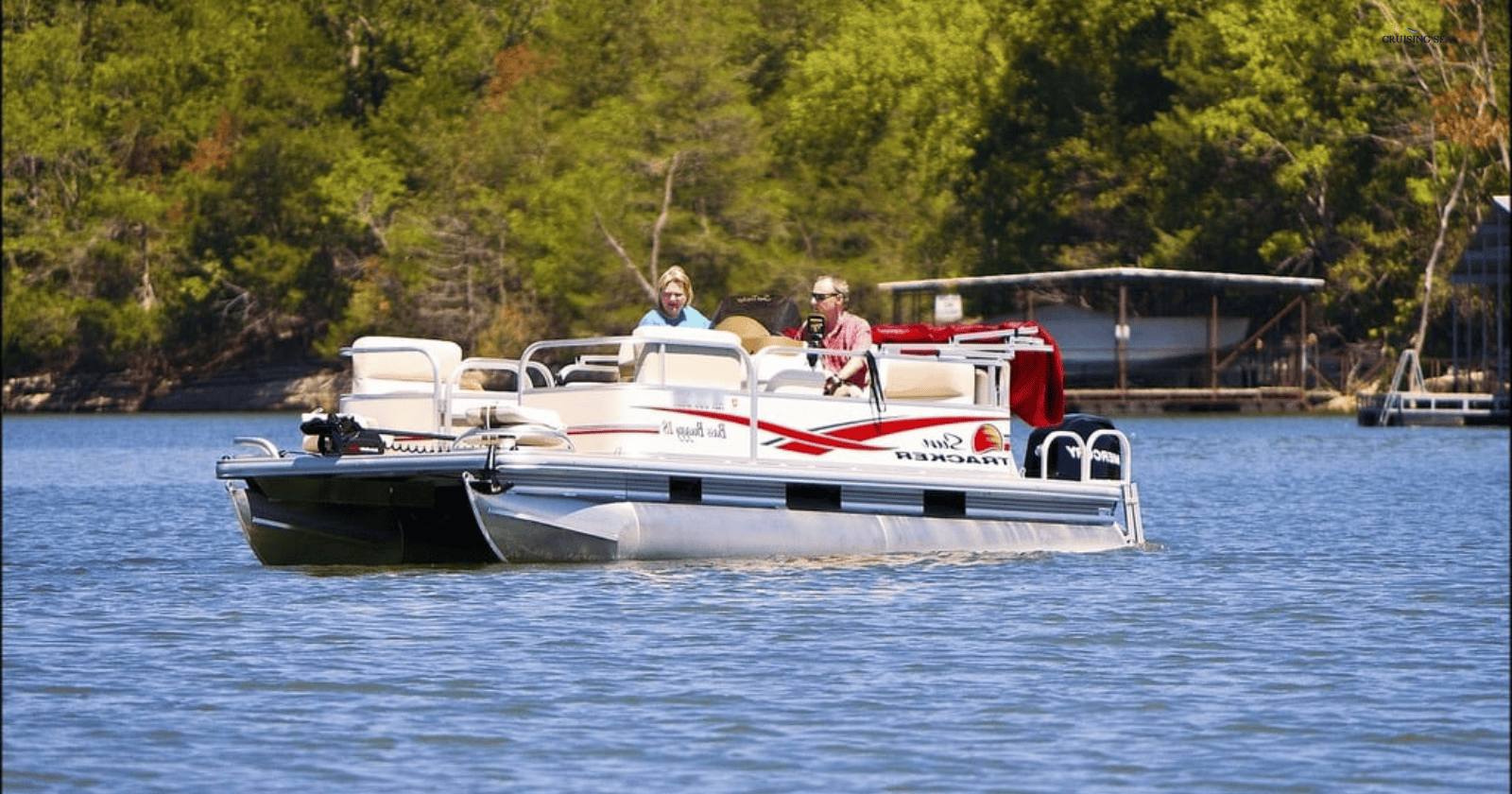Are you getting started with boating and wondering what boat to choose for your first steps on the water? If so, you’re asking a fantastic question. With many types and models available, picking the right one can be a bit challenging.
It’s essential to consider factors such as your budget, intended use, and the size of the body of water you’ll be boating in.
But no worries, you’re in good hands. Here, you’ll find the best boats for beginners and great tips to help you make the best decision.
What to Consider When Choosing Your First Boat?
Size and Stability
The size and stability of a boat are crucial. Smaller boats (under 20 feet) are easier to handle and perfect for beginners.
They’re also more stable in calm waters. Stability is key for safety and comfort, especially if you plan to have family or friends onboard.
Larger boats offer more space but can be more challenging to operate. Consider where you’ll be boating—lakes and rivers may require a different size compared to open seas.
Stable boats prevent tipping and provide a smoother ride, making your boating experience more enjoyable.
Budget and Costs
Budgeting is essential when buying your first boat. The initial price tag is only one factor; you also need to consider ongoing costs like fuel, insurance, maintenance, and storage.
Set a budget and stick to it. Look for boats that provide good value without breaking the bank. Financing options can make boats more affordable but always plan for the total cost.
Second-hand boats can save money but might require more maintenance. Research different boats, compare prices, and check for hidden costs before making a decision.
Purpose and Versatility
Think about why you want a boat. Are you planning to fish, cruise, do watersports like tubing, wakeboarding, and water skiing, or just relax on the water?
Different boats serve different purposes. Fishing boats are designed with features like rod holders and live wells while cruising boats offer more comfort and amenities.
Versatile boats, like runabouts, are great if you plan to do a bit of everything. So, before investing in a boat, take your time and think about what you plan to do most.
Operation and Maintenance
Operating a boat should be straightforward and not overwhelming. If you are a beginner, look for simple boats. Most starter boats come with basic controls and are designed for ease of use.
You’ll also want to consider maintenance. How much time and money are you willing to spend?
Boats need regular care, especially for the engine, hull, and electronics. Check if parts are easy to find and if you can handle some tasks yourself. Some boats have lower maintenance costs, which can save you a lot of hassle and money in the long run.
Top 5 Beginner-Friendly Boats
1) Pontoon Boats
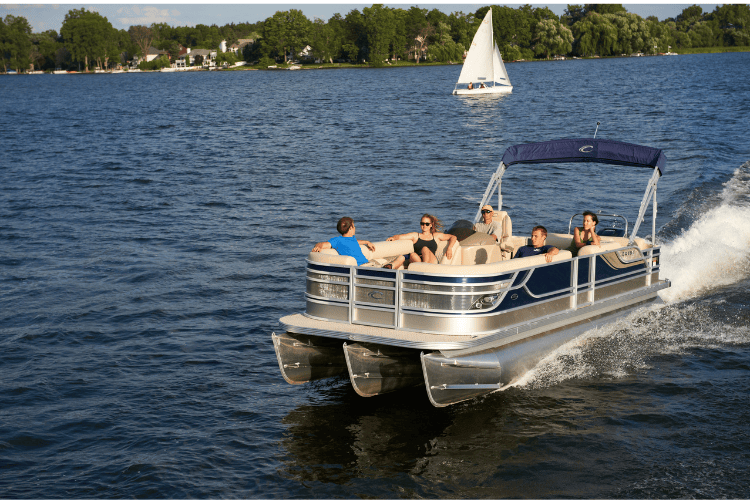
Pontoon boats are excellent for beginners since they offer great stability and comfort. They feature a flat deck mounted on two or three buoyant tubes called pontoons. This design makes pontoons stable, making them perfect for relaxing and enjoying with family or friends.
Driving a pontoon is relatively easy, especially compared to other boats. It’s a little similar to driving a car; instead of pushing on a pedal, you move the throttle lever forward to accelerate and backward to slow down.
However, Pontoons have some drawbacks. For instance, they are easier to manipulate at a higher speed and more difficult at a slower speed, particularly in high winds or tight spaces like docks, due to their design.
They have ample storage space and comfortable seating. You can enjoy fishing, swimming, or just lounging on the water. High-end models include a spacious deck, often with sunbathing areas, and maybe even a small kitchenette. Popular beginner models include Sun Tracker Party Barge and Bennington S Series.
2) Bowriders
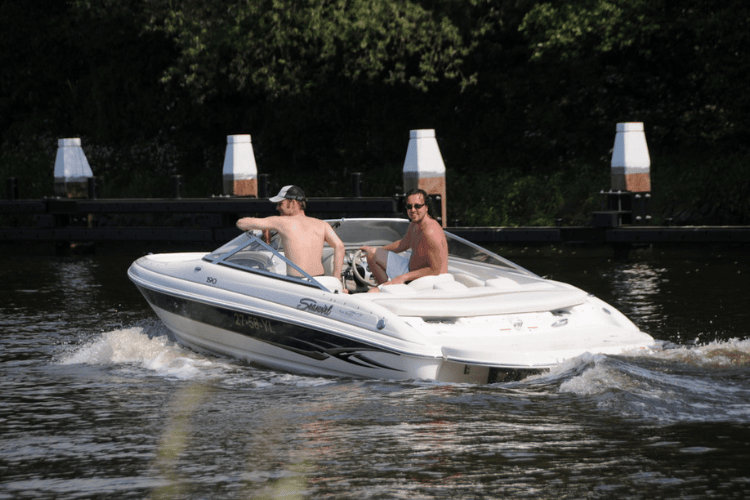
Bowriders are one of the most versatile boats for beginners. They feature an open bow area where passengers can sit, providing extra comfort and a fantastic view.
Quality bowriders like the Bayliner 170 Bowrider are equipped with powerful engines, allowing you to enjoy various activities such as water skiing, tubing, and cruising.
Bowriders often have comfortable seating and ample storage for your gear. The swim platform at the rear makes it easy to take a dip or climb back on board after water activities.
Driving a bowrider is relatively easy for beginners. They typically have a steering wheel and throttle controls similar to a car, making them intuitive to operate. Also, they are designed for stability and smooth handling, making them forgiving for new boaters.
Their V-shaped hull allows them to cut through waves and maintain a comfortable ride. However, due to their open bow design, Bowriders can be sensitive to weight distribution. So, it’s important to balance the load evenly and avoid overloading the bow, especially in choppy conditions.
3) Center Console Boats
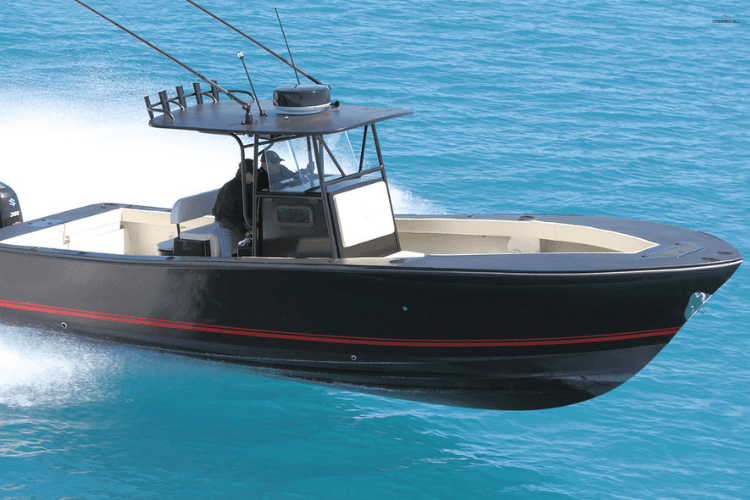
Center console boats are also excellent for beginners. These boats are designed with fishing in mind and are great for cruising as well. They have a central control station surrounded by an open deck, allowing you to move easily around the boat.
Features include rod holders, tackle storage, and sometimes even a trolling motor.
These boats are perfect for anglers who want a versatile, easy-to-handle boat. Some models even offer a fish-and-ski setup, making them ideal for family outings as well.
Recommended choices include the Boston Whaler 190 Montauk and the Grady-White Fisherman 180.
4) Aluminum Fishing Boats
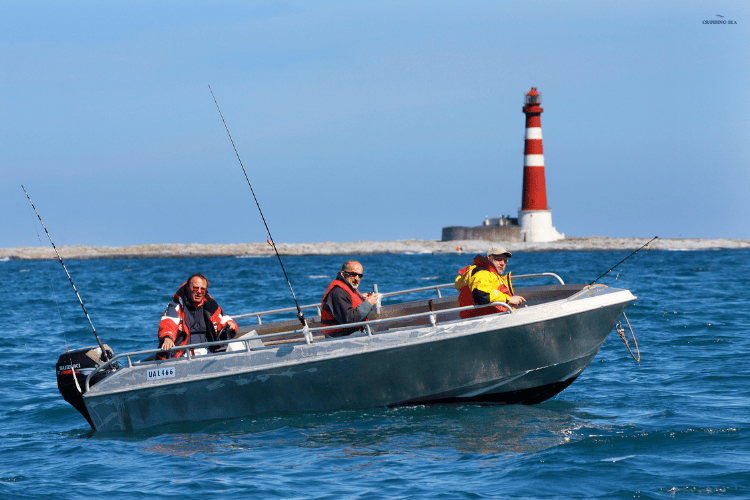
Aluminum fishing boats are known for being durable and easy to maintain. Their lightweight construction makes them easy to tow and launch, which is perfect for beginners.
These boats are great for exploring shallow waters and inland lakes. They often include features like storage compartments for fishing gear and live wells for keeping your catch fresh.
Popular models include the Lund 1650 Rebel and the Tracker Pro Team 175 TF.
5) Sailboats
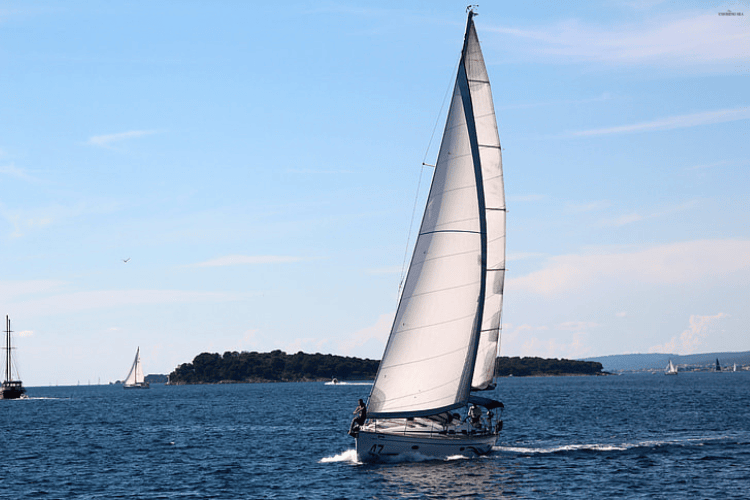
Sailboats are perfect for those who want to learn the basics of sailing. Beginner sailboats like the Sunfish or the Laser are small, lightweight, and easy to handle.
These boats teach you essential sailing skills, such as maneuvering and working with the wind. Other great options for beginner sailboats include sailing dinghies, daysailers, weekender sailboats, and trailerable boats. These boats are typically nifty, fun, and designed with safety and ease of use in mind.
Sailboats provide a unique experience on the water, relying on wind power for movement. They are cost-effective and can offer a sense of peace and connection with nature that motorized boats can’t.
What is the Easiest Boat to Maintain?
When it comes to low-maintenance boats, there are several options that are well-suited for beginners. Boats with an outboard engine are generally easier to care for and don’t require much maintenance. Also, they’re lighter than inboard engines with the same horsepower, making them a great choice if you seek a low-maintenance option.
Another easy-to-maintain boat type is a pontoon boat. Pontoons come in a wide range of sizes and options, but they’re generally easy to own and maintain. The great thing about Pontoon boats is that their hulls are made of aluminum, which withstands corrosion well in salt water.
If you prefer a smaller boat, a center console boat with an outboard engine could be a good choice. It’s affordable, relatively quiet, and easy to maintain on a daily basis. Although you still need to wash, polish, and wax the gel coat of a fiberglass hull, that’s only a minor annual chore.
When considering low-maintenance boats, it’s important to keep things simple. Low maintenance means getting a bare-bones boat without fancy cushions, gadgets, and gizmos. Any custom builder can build a bare-bones boat that is easy to maintain.
In short, boats with outboard engines, pontoon boats, and simple center console boats are generally the easiest to maintain for beginners.
How Can You Ensure a Safe and Enjoyable Boating Experience?
Start by taking a boating safety course. This not only teaches you the basics but also helps you be more confident on the water. A certified course can often earn you discounts on insurance.
Always carry essential safety gear. This includes life jackets for each passenger, a first aid kit, and emergency signals. Make sure your boat is equipped with a fire extinguisher and a marine radio. Knowing how to swim can be a big plus.
It’s also crucial that you understand the “rules of the road” for water traffic. This helps prevent boat accidents. Knowing how to dock your boat properly and how to read weather conditions properly is as important as the other safety measures mentioned.
What Should You Know Before Buying a Boat?
Owning a boat can be fun, but comes with responsibilities. You’ll need to consider where to store your boat. Options include renting a dock slip or using a trailer if you choose to store it at home.
Maintenance is key to keeping your boat in good shape. This includes regular engine checks, cleaning the hull, and ensuring that your galley equipment is in working order. Create a routine inspection checklist.
Insurance protects you and your boat. Policies vary, so find one that covers accidents, theft, and damage. Don’t forget to consider the costs of registration and licenses, which depend on your location. Many boat owners find it helpful to join a boating club, which can offer boaters community, safety courses, and access to a fleet of boats, eliminating maintenance responsibilities.
How to Take Your Boating Experience to the Next Level?
Once you’ve mastered the basics of boating, you might start thinking about bigger and better adventures. Upgrading your boat and exploring advanced boating activities can give you more exciting excursions on the water.
Considering an Upgrade
As you gain experience, you may find that your current boat no longer meets your needs. Upgrading to a more advanced boat can offer more space, better performance, and enhanced features. For instance, moving from a small dinghy to a power cruiser provides more comfort for longer trips or overnight stays.
Compare features like engine power, stability, and specialty gear. For fishing enthusiasts, upgrading to a boat with built-in rod holders, a self-bailing cockpit, and more advanced navigation systems can improve your experience. If you’re into water sports, look for boats with tow bars, larger wake capabilities, and advanced safety features.
Exploring Advanced Boating Activities
With a more powerful boat, you can start doing activities that require more skill and better equipment. Bass fishing can be more enjoyable with a specialized fishing boat equipped with multiple fish finders and live wells to keep your catch fresh. Or, if you’re into speed and thrills, get into sports like wakeboarding or water skiing, which require powerful engines and specialized tow setups.
Final Words!
When choosing a starter boat, it’s best to choose one that is easy to handle and maintain. Keep it as simple as possible and focus on learning the essentials of boating, including safety, docking, anchoring, and maintenance. As you gain experience and confidence, you may want to consider upgrading to a bigger and better boat that suits your growing skills and needs.
Want More Tips?
Subscribe to Cruising Sea newsletter to receive every two weeks the latest posts straight to your inbox!

Daniella has been passionate about travel, the sea, and nature for many years. As a child, she frequently traveled throughout the Mediterranean and continued with her journeys throughout her adult life.
Her experiences have created the desire within her to share her love for traveling with other passionate and adventurers who want to discover beautiful horizons and new cultures.

